Seven Impossible Interviews Before Breakfast #42
(The Radar-Books Edition): Nancy Crocker
(with some picture book love thrown in as well) . . .
 August 30th, 2007 by jules
August 30th, 2007 by jules
 {Note: For the rest of today’s Radar-Books schedule, scroll down to the bottom of this post} . . .
{Note: For the rest of today’s Radar-Books schedule, scroll down to the bottom of this post} . . .
It’s arguable whether or not Nancy Crocker’s first novel, Billie Standish Was Here (Simon & Schuster Books for Young Readers), qualifies as a Radar-Book, as in a book which has been entirely too overlooked. In the grand scheme of things, it’s still a fairly young novel, having been released just this past June, not to mention it has received consistently good reviews: “Set in the late 1960s and early ‘70’s, this tender, touching account of intergenerational friendship provides rich historical context for two memorable female characters who redefine the meaning of family and love” (starred review in Kirkus Reviews), and “{t}his story is beautiful, painful, and complex, and the descriptions of people, events, and emotions are graphic and tangible” from School Library Journal. It was even chosen as a Summer 2007 Children’s Book Sense Pick.
But I’m still declaring it under the radar, because it didn’t get a whole heapin’ dose of blog buzz: The only other blog review I knew of was Kelly Herold’s from July, and I just found this one at a blog called Hypothetically Speaking.
Plus, to be perfectly honest, it is a great excuse for me to interview the author, Nancy Crocker, pictured above.
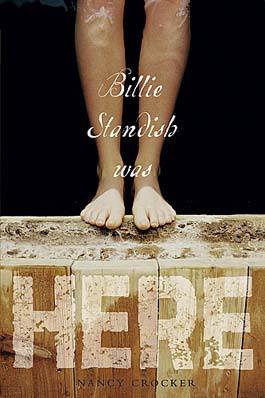 It’s the summer of 1968 in the small town of Cumberland, Missouri, and Billie — from whose perspective the entire novel is told — is eleven years old. Not only does she not register in her parents’ radar on any level whatsoever (other than providing her food and shelter, as if she’s simply a pet to feed), but the town, way past its heyday, suddenly seems even lonelier than normal after a long period of “bone-soaking rain.” School has ended for the summer. Daily, Billie finds herself alone in her room, as usual, her parents never there. When they are there, she is ashamed and afraid to speak up, doing so making her feel flat-out strange (after her mother makes one particularly hateful comment to Billie, she winces: “When she caught me off guard she could still make me wonder just when it was that she decided to stop taking care of me altogether”). After venturing out one day, she sees and hears no one, wondering why the town seems abandoned and feeling as if she might shrink. As she’s about to turn back for home, she sees and speaks to the neighbor across the street, Lydia Jenkins (“{s}he looked like every grandma in the world”) and learns that the town members are afraid the levee may break. Though everyone else seems to be off working to shore up levees against the river, Billie’s parents, Lydia tells her, are still working in the field every day, as always, Billie’s father having remembered that when the levee broke in ’51, there was enough time to sandbag before the water got to town. Eventually, Billie comes to learn that Miss Lydia is the only other person besides her family to stick around, and a friendship with her is born out of circumstance.
It’s the summer of 1968 in the small town of Cumberland, Missouri, and Billie — from whose perspective the entire novel is told — is eleven years old. Not only does she not register in her parents’ radar on any level whatsoever (other than providing her food and shelter, as if she’s simply a pet to feed), but the town, way past its heyday, suddenly seems even lonelier than normal after a long period of “bone-soaking rain.” School has ended for the summer. Daily, Billie finds herself alone in her room, as usual, her parents never there. When they are there, she is ashamed and afraid to speak up, doing so making her feel flat-out strange (after her mother makes one particularly hateful comment to Billie, she winces: “When she caught me off guard she could still make me wonder just when it was that she decided to stop taking care of me altogether”). After venturing out one day, she sees and hears no one, wondering why the town seems abandoned and feeling as if she might shrink. As she’s about to turn back for home, she sees and speaks to the neighbor across the street, Lydia Jenkins (“{s}he looked like every grandma in the world”) and learns that the town members are afraid the levee may break. Though everyone else seems to be off working to shore up levees against the river, Billie’s parents, Lydia tells her, are still working in the field every day, as always, Billie’s father having remembered that when the levee broke in ’51, there was enough time to sandbag before the water got to town. Eventually, Billie comes to learn that Miss Lydia is the only other person besides her family to stick around, and a friendship with her is born out of circumstance.
Here’s what else I wrote about Billie Standish in my review this past May of an advance proof of the novel:
Now, here comes the tricky part: I do not want to give away any spoilers, though this isn’t a plot-heavy book (as opposed to the resplendent characterizations and symbolism, for instance). In fact, Crocker places the novel’s two big, dramatic plot points at the beginning of the novel and before we even reach page sixty. Let’s suffice it to say that, as the book jacket will tell you, tragedy befalls Billie, a tragedy unmistakably linked to Miss Lydia, and Miss Lydia takes it upon herself to aid Billie in her time of crisis in a most dramatic way. A lot of other authors would have placed the second big plot point at the climax or even close of a book, which would not have made the book stand out from any other novel purporting to be a rather “gritty,” “heart-tugging” “coming-of-age story” in a small town (you know all those labels) about overcoming abuse. Wisely, Crocker leaves well over one-half of the novel for a full focus on the relationship between Miss Lydia and Billie Marie that spans several of Billie’s teenage years (to be sure, though, there are more plot turns and more of Crocker keeping us on our toes, wondering what exactly the wreckage of Billie’s tragedy will reveal and bring about in her life) and shows us how such a profound friendship can rescue a person.
I found it to be quite compelling and moving, Crocker knowing when to put on the brakes and keep things from getting too schmaltzy and finding just the right balance of honesty and tension and irreverent humor (in just the right spots) and compassion. The ending — which also involves the character Harlan, a school-mate of Billie’s and a central character in the novel, the only person other than Miss Lydia to show her compassion in her short life — is also one I won’t forget for a long time. As I wrote in my review, if this is the first novel that springs from the mind of Nancy Crocker, I can hardly wait to see what she brings us next.
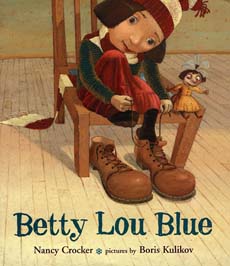 Though I’m shining a light on the novel here — as well as an interview with Nancy — I will add that the one other book she’s written is a picture book, entitled Betty Lou Blue (Dial Books for Young Readers; October 2006), illustrated by Boris Kulikov, which I reviewed here in March of last year (Kelly Herold also reviewed this one last year, as that was how I found out about the book). Since I enjoyed Betty Lou Blue’s tale as well; since next week will be Picture Book Week here at 7-Imp; and since the illustrator of this picture book, the very talented Mr. Kulikov, gave permission for me to share a spread from the book in this interview, I decided to ask Nancy a bit about that picture book as well in the interview below.
Though I’m shining a light on the novel here — as well as an interview with Nancy — I will add that the one other book she’s written is a picture book, entitled Betty Lou Blue (Dial Books for Young Readers; October 2006), illustrated by Boris Kulikov, which I reviewed here in March of last year (Kelly Herold also reviewed this one last year, as that was how I found out about the book). Since I enjoyed Betty Lou Blue’s tale as well; since next week will be Picture Book Week here at 7-Imp; and since the illustrator of this picture book, the very talented Mr. Kulikov, gave permission for me to share a spread from the book in this interview, I decided to ask Nancy a bit about that picture book as well in the interview below.
Nancy’s bio at her site states: “I started singing on stage and radio when I was 12 and once appeared with Loretta Lynn when I was 13. One day in my life, but the one fact everybody pulls out of my info, so there you go.” She graduated with a B.A. in Music and has worked as an actor: “I’ve appeared in five independent films, several dozen plays, countless radio and TV commercials, and innumerable corporate films,” she adds. “Through it all, I wrote. Poetry, short stories, personal essays (some of which were actually published), songs… you name it.”
I’d like to thank Nancy for stopping by to help me shine a light on the novel. If you haven’t already read this quiet, little gem of a book, Billie Standish Was Here, consider this entire post my hat thrown into the ring in an effort to get you to do so.
Without further ado, here’s Nancy . . .
Jules: When I read Billie Standish, I was struck by what I called the “unabashed . . . heart” at its center (yet, fortunately, you never let things get too maudlin or histrionic) and how you let well over one-half of the book be about the redemption that comes after the tragic events of the beginning of the novel. Was it difficult to structure the novel in that way — to make it be about that redemption (as the result of an unlikely friendship between a young girl and an elderly lady) and not the two big plot points which Book Sense called the “assault and its aftermath” (I don’t want to spoil the plot for readers of this interview who haven’t experienced your book)? Did you have to work hard, in other words, to avoid structuring it as A Book About Abuse?
Nancy: Two of my earliest readers were concerned about the unusual structure of the book. But I had never planned for it to be, as you put it aptly, a Book About Abuse. I saw it as a story about identity, redemption and the transcendent ability of love to salvage a human life, and I could not see how to put a climax and denouement in the predictable spots without ruining that story.
Once it got to Simon & Schuster, there was never an issue with the book’s unusual ‘shape.’ The day I was offered a contract I kept saying, “They got it. I can’t believe they all got it.”
Jules: Was it hard as hell to say goodbye to Billie and Miss Lydia and Harlan at the book’s close?
Nancy: Oh, Lord, yes. Especially Miss Lydia. When I typed “What I have now will have to last me from now on,” I was a mess. I still can’t read the end of the book without crying.
Jules: Is your obvious affection for the characters — something that enhanced for me the experience of reading it — equally distributed, or is there one you hold closer to your heart?
Nancy: Have you ever read Erma Bombeck’s wonderful essay to her three children where she tells each of them why he or she is her favorite? That’s how I feel about these characters. I love them all differently, but no one more than another.
Jules: On that note, was it hard to write about the “assault”? Was it difficult to make it believably intense yet not gratuitiously explicit/sensationalized (which you did a great job of doing)?
Nancy: It was awful. Billie’s story started in short story form thirteen years ago; I was still a smoker at that time, and I don’t know how many packs it took to get through that scene. I never wanted to be explicit, so it wasn’t difficult to avoid sensationalizing it. The hard part was trying to make it real enough for the reader to fill in the details for himself. A very few people have referred to the scene as graphic, but I can only assume they’re remembering what their mind’s eye saw when they read it.
Jules: You really captured the voice of Billie so well. Did you ever know a Billie Standish (or even a Miss Lydia, who also jumps off the page), especially since you grew up in small-town Missouri as well?
Nancy: Most of the girls I knew -– including myself –- were a lot more like KarenDebbie. Quivering masses of insecurity, trying to disappear behind a curtain of makeup and into a herd of conformity. (We got better, I’m happy to say.)
There’s a lot of my Grandma Grace in Miss Lydia — certainly in the way she talks. But mainly I was trying to channel all the goodness in everyone I know. Isolation during adolescence is such a universal theme; I tried to create a safe haven for Billie and for the reader in Miss Lydia -– to help them believe that kind of love is there for all of us.
Jules: At the risk of sounding like every other question thrown at J.K. Rowling right now about her characters, can you tell us what Billie is doing (and Harlan, too) five years after the book’s close? Or would you rather remain reticent and leave that up to us as readers?
Nancy: Hmmm. Five years later, Billie and Harlan are preparing for their junior year of college, but they haven’t written home. By that, I mean they aren’t talking to me at present. The book was expanded from a short story because Billie and Miss Lydia wouldn’t leave me alone. If Billie and Harlan have anything further to say, I’m certainly willing to listen.
Jules: A lot of our readers like to hear authors talk about this. If, by chance, you hate this question, just promptly ignore it: Tell us about your writing process (starting wherever you like: getting the idea, starting to write, under deadline, etc.). Do you outline plot before you write or just let your muse lead you on and see where you end up?
Nancy: I usually start with a kernel of truth and begin asking “what if?” For example: my hometown did nearly evacuate one summer when I was growing up. It took the distance of some years to see that as remarkable, but then I started wondering how I could use it. I’ve always been fascinated with the nature of identity -– perception vs. reality -– and I started playing with the idea that the biggest thing that ever happened in this tiny town (where everyone thinks they know everything that goes on) was somehow a secret between two people. Do any of us truly know everything that’s going on under our own roof, let alone next door? And it seemed more powerful to make the secret between two people of different generations and separate families.
I do not outline. I know the beginning and end when I start, and have learned to trust that the route will become apparent — and to get out of the way when it does. I never planned for Harlan to become such a central figure -– I simply wanted to introduce a positive male character -– but he came to flat-out amaze me as well as Billie. I’m very glad he brought so much to the party.
I do keep a handwritten timeline taped to the wall next to my desk so I can tell at a glance where I am and when any particular plot point happened. And there are notebooks all over the house with one sentence scrawled here or there -– when I’m rewriting, it’s pretty much all-consuming. I haven’t walked into walls or forgotten my child’s name yet, but I’ve come close.
Jules: Are you working on a new novel, by chance, or any other writing projects you can tell us about?
Nancy: I have a novel sitting on my editor’s desk, and am making notes for one I plan to start when my second-grader goes back to school. I write personal essays from time to time as well, and hope to have a collection someday.
Jules: Now, for a few Betty Lou Blue questions, especially since we’re gearing up here at 7-Imp to celebrate picture books all next week . . .
What was it like to see Boris Kulikov bring Betty Lou Blue to life with his images?
Nancy: It was like an electric shock to the psyche. I was awed and humbled by his ability to show complex emotions so simply. It was a bit of a shock, though, to find out she wasn’t a blonde with blue/green eyes. Everything in life boils down to point-of-view, doesn’t it?
Jules: Did you have any say in choosing him as the book’s illustrator?
Nancy: I did, and my editor and I did a delicate dance for over a year trying to land on someone we both loved. It was frustrating, but I’m so glad we took the time. Now I can’t imagine the book being done by anyone other than Boris.
Jules: And what, if anything, inspired Betty’s particular dilemma: big feet? I love the book’s opening line with the “Whackety, thwackety, flappety feet,” and I try to work that phrase into conversations now when I can.
Nancy: Ha! I love it. The truth is, I was lying on the couch ill one afternoon when the first phrase “Betty Lou Blue had the world’s biggest feet” came into my head unbidden. I immediately thought, “Huh. What would that sound like?” and the answer not only came, but made me laugh. So I grabbed my laptop and started typing away. In rhyme. And a mere eleven years later, it became a book.
Jules: Will you bring us more picture books?
Nancy: I hope so. I have a file of ideas and an opening line I love (which to date refuses to provide its successor, dammit); right now, time is my biggest constraint and I enjoy getting the novels out of my head too much to devote a lot of time to other writing projects.
Jules: We like to ask authors and illustrators sometimes: What’s in heavy rotation on your stereo/iPod lately? And I’m especially interested in your answer, since you have a music background.
Nancy: The most recent artists to knock me over are Amy Winehouse and the duo Big and Rich. Otherwise, I’ve been on a nostalgia kick -– Johnny Cash, Ray Charles, et al. Carole King’s “Tapestry” album never ceases to amaze; I re-discover it every so often, including this summer.
Jules: And here comes what is probably The Perfunctory Loretta Lynn Question: What was that like?
Nancy: First, understand she was MY IDOL at that time. I don’t even remember if I sang one song or two; I mainly remember glancing back every few seconds thinking yes, it’s true. Loretta Lynn is playing rhythm guitar and grinning at ME. That night, I sang with Jack Greene’s band on the Midnight Jamboree and was calmed down enough to enjoy it. Remember, in “Coal Miner’s Daughter,” the first place Loretta Lynn sang in Nashville? It was the Ernest Tubb Record Shop on the WSM Radio Midnight Jamboree. That was a surreal scene for me to watch years later in a theatre.
Jules: Okay, on that note . . . this has nothing to do with your current work as an author, I suppose, but you started singing on stage and radio when you were twelve years old. As a music lover, I’m curious: How did that come about? Do you come from a family of performers?
Nancy: I come from a family of goofballs. My father was acquainted with a local celebrity… who had this mawkish, self-penned signature song. One day Dad and I wrote a fairly wicked parody of it and flipped a coin for which of us had to call the guy and sing it to him. (What can I say other than this was not out of character?) I lost the toss. The fellow was not amused, but did like my voice enough to invite me onto his Saturday morning radio show. I became a regular, then found myself singing at regional “opries” and such. (And today I learn my spell-check does not recognize the plural of “opry.” Or even “opry” itself. Odd.)
Jules: And in which independent films did you perform? Do you miss acting?
Nancy: I recently attended the premiere of “Arnolds Park” in Okoboji, Iowa. It’s fairly safe to say none of the others will be coming your way, even if that one does.
I still keep a hand in acting. And a big toe. Sometimes both elbows. These days it’s mainly voiceovers, though I did do a play in the local Fringe Festival last year. Do I miss doing it full-time? As the saying goes: “It’s more fun to be the painter than the paint.”
Jules: Do you still write poetry? Who are some of your favorite poets, either contemporary or not so?
Nancy: Not at present . . . I don’t read nearly as much poetry as I should. My favorite poets tend to be songwriters: Randy Newman, Lyle Lovett, John Prine, John Hiatt . . .
Jules: I like your new web site. Do you think you’ll ever blog? Or is that not for you?
Nancy: All I can say for certain is that it’s not for me yet.
Jules: What’s one thing that most people don’t know about you?
Nancy: Up until June, the fact that I once appeared with Loretta Lynn when I was thirteen. Now? Hmmm. I’ve always wanted to sing the national anthem before a baseball game, but am afraid to try because I can’t get through “Oh, say does that star-spangled banner still wave…” and on to the end without choking up. Our founders went through some serious stuff so that we can run into other cars while talking on our cell phones.
Jules: If you could have three (living) authors — whom you have not yet met — over for coffee or a glass of rich, red wine, whom would you choose?
Nancy: For now, I think I’d rather read about my favorite living authors. Could I have Jon Stewart over for three glasses of wine instead, please?
Jules: I know this is a cliche question, but as a book lover, it interests me: What books or authors influenced you as an early reader?
Nancy: I spent an entire summer (age nine? ten?) reading women’s biographies: Amelia Earhart, Dolly Madison, Molly Pitcher, Clara Barton, Florence Nightingale, etc. That was eye-opening for a girl in a town of one hundred people. Fiction? There were Little Women and the whole Anne of Green Gables series, and I’ve loved Mark Twain forever. The books I remember most as a YA reader are To Find a Man; My Darling, My Hamburger; and Mr. and Mrs. Bo Jo Jones. Then I started getting into Johnny Got His Gun and Kurt Vonnegut and such.
Jules: We like to ask people the wonderfully weird set of questions called The Pivot Questionnaire — made most famous by its use on “The Actors Studio” — since who knew that, say, asking someone what their favorite sound or noise is could tell you so much about them. So here goes:
What is your favorite word?
Nancy: I shy away from absolutes, but “camaraderie” is right up there. So pretty – a self-contained poem.
Jules: What is your least favorite word?
Nancy: I hate words that sound like the opposite of what they mean, like “exculpatory.”
Jules: What turns you on creatively, spiritually or emotionally?
Nancy: Quiet. A quiet landscape or a quiet room, together with a quiet mind.
Jules: What turns you off?
Nancy: Sleep deprivation.
Jules: What is your favorite curse word? (optional)
Nancy: Oh, I’m terribly fond of them all. Right now “asshat” is having a good run.
Jules: What sound or noise do you love?
Nancy: A champagne cork. It never signifies bad news.
Jules: What sound or noise do you hate?
Nancy: W.’s voice. I’ve had a visceral reaction to it since before he was not elected the first time.
Jules: What profession other than your own would you like to attempt?
Nancy: I’d like to be Czar of Names; all U.S. birth certificates would have to be approved by me and I’d have the authority to tell people, “No, you are not going to name your baby that silly-assed crap, you are going to give them a proper name. Now.” Barring that, probably photography (after much training).
Jules: What profession would you not like to do?
Nancy: Drive a semi or sell anything on commission. I can’t decide which of those would be worse.
Jules: If Heaven exists, what would you like to hear God say when you arrive at the Pearly Gates?
Nancy: “Nicely played, my girl. Now run on in, your dad has a new joke.”
Radar-Books schedule for today:
- Big A, little a: A interview with Helen Dunmore
- Bildungsroman: Swollen by Melissa Lion
- A Chair, A Fireplace & A Tea Cozy: Friends for Life and Life Without Friends both by Ellen Emerson White
- Chasing Ray: Juniper, Gentian, and Rosemary by Pamela Dean
- Finding Wonderland: Lucy the Giant by Sherri L. Smith
- A Fuse Number 8 Production: The Noisy Counting Book by Susan Schade
- Jen Robinson’s Book Page: The Treasures of Weatherby by Zilpha Keatley Snyder
- lectitans: Who P-P-P-plugged Roger Rabbit? A Hare-Raising Mystery by Gary K. Wolf
- Miss Erin: A discussion of Erec Rex: The Dragon’s Eye and an interview with author Kaza Kingsley
- Shaken & Stirred: The Changeover and Catalogue of the Universe, both by Margaret Mahy
- Writing and Ruminating: Hugging the Rock by Susan Taylor Brown
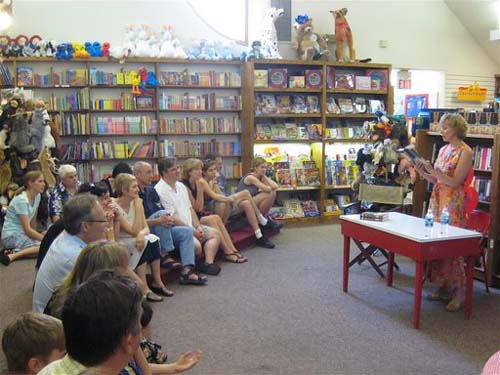
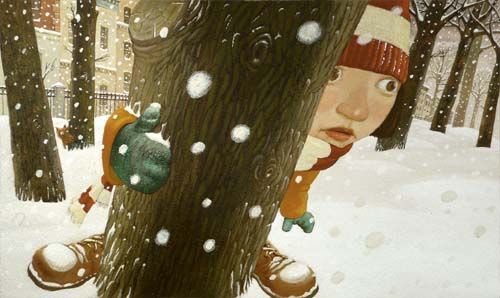
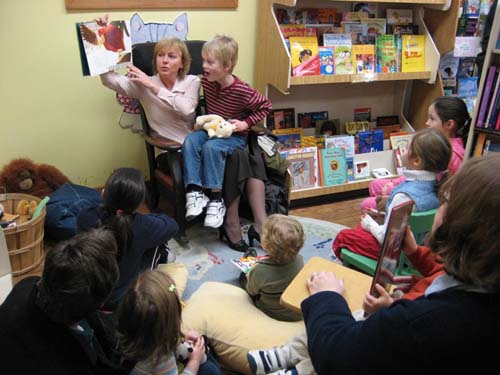

“Czar of names…” – I spit out my ice tea when I read that bit I was laughing so hard!
That job is so needed!!!
[…] Erin: A discussion of Erec Rex: The Dragon’s Eye and an interview with author Kaza Kingsley 7 Impossible Things Before Breakfast: Billie Standish Was Here by Nancy Crocker Semicolon: Christian fiction you may have missed Shaken […]
jules, you’re slaying me. I already wanted to read Billie Standish was Here, and now, after this interview? Is the bookstore open yet?
I wonder if she ever sang at the BellWitch Opry in Robertson County? I went there once, to hear my husband’s grandmother sing. (She sang, and dedicated it to us, One Day at a Time, Sweet Jesus. And she swung the microphone in a great big circle, like a pro.)
And I love that story about Nancy’s dad and the coin toss. I hope there’s an essay out there somewhere about it. And I hope she’ll let me meet him if I get through the Pearly Gates too…
[…] 7 Impossible Things Before Breakfast: Billie Standish Was Here by Nancy Crocker […]
Sara, THE BELLWITCH OPRY? Why have I never heard of this?
Having spent my formative years in middle Tennessee, I still shudder when someone says that woman’s name. The legend was always that, if you stood in the dark in the bathroom and said “I hate the Bell Witch” over and over, she would appear in the mirror — or, alternately, blood would run down the mirror or something else similarly absurd. But, dude, I’m thirty-five years old and that phrase (“I hate the Bell Witch”) sometimes still runs through my head when I’m in the dark and I find myself thinking, “NO! I don’t mean it! Don’t start haunting me, woman!”
Silly, I know. But it’s a having-grown-up-in-Middle-Tennessee thing.
I’m probably going to find blood or fingernail marks on my mirror for even typing this. If I disappear tomorrow, just remember this comment I posted.
Sara, you’ll like this book. I just know it.
Colleen, yes, the Czar of Names is a brilliant idea. I’d like to be her Duke or, uh, Lord or Count or Baron (?? someone stop me now) . . . whoever is under a Czar — or sidekick to a Czar — is what I mean. Maybe my title can just be “Sidekick.”
It’s okay, jules…my great-grandmother-in-law sang a hymn there. I think that exorcised any bad spirits. But go ahead, do a Google search. I dare you.
Jules is right. It’s a mid-TN thing. I got shivers just reading that phrase typed up there on our blog, and I’m tempted to edit it out. JULES, YOU MAYBE CURSED OUR BLOG!!! Do we have tech support for that? Does WordPress do exorcisms?
Nancy Crocker rocks! Thanks for the interview, folks.
Last year, Nancy, my son had a kid in his class named Izaa. I’ll let you guess which name it is 🙂
Fun interview.
I despise hearing W.’s voice, too.
I’ll ask the tech support husband about exorcising the blog. Maybe you’re immune now, Eisha, since you moved up North. I might be totally screwed, as we MOVED BACK TO BELL WITCH LAND.
Aaaah, I said her name again.
Where were we? Yes, wonderful interview. Not that I’m bragging — it’s all due to the good subject matter: the great novel; the picture book, too; Boris’ illustration (and, hey, I talked him into being featured one Sunday in September); and the delightful Nancy Crocker, with whom I want to have a drink one day.
I’m gonna be bold and do Sara’s suggested Google search later (if I can’t sleep later, I’m blamin’ you, Sara!) . . .
[…] Erin: A discussion of Erec Rex: The Dragon’s Eye and an interview with author Kaza KingsleySeven Impossible Things Before Breakfast: An interview with Nancy Crocker, author of Billie Standish Was Here Fuse Number 8: The Noisy […]